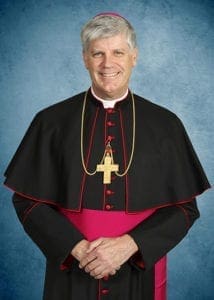When conscience meets the common good
By BISHOP BERNARD E. SHLESINGER III | Published September 30, 2021 | En Español

Bishop Bernard E. Shlesinger III
I had a conversation recently with someone about whether or not authorities can force or pressure a person to be vaccinated. I agreed with this person that one’s conscience must ultimately be obeyed in acting and that conscience rights should be respected regarding moral issues. However, I also told this person that I would not sign a religious exemption form that supports one’s choice to remain unvaccinated.
I mentioned to this person that my role as a bishop (father) includes teaching and informing the conscience of others rather than abandoning them to drawing conclusions on their own. To say simply to another person “whatever you think or decide” without teaching the person the truth or good to be done would have been irresponsible on my part.
Regarding the vaccine to protect life, consideration of the common good cannot be set aside when making moral decisions. The fundamental principle as stated by St. Thomas Aquinas regarding moral decisions is “Good is to be done and pursued, and evil is to be avoided.”
Conscientious objection can be respected for religious reasons regarding whether or not a person can take up arms against another, but the duty to preserve one’s country and even one’s own family is a good that may outweigh one’s personal preference if there is a just cause involved. If there are conscientious objectors regarding the defense of one’s country, should we promote conscientious objection regarding a public health concern? In conscience, I cannot do this as a bishop and thus cannot promote the signing of religious exemption forms.
I confess that I get a little annoyed when people claim rights of conscience relative to the vaccine when they do not speak of duties toward others. For example, when people say I have a right to choose (i.e. pro choice), I say that they have a duty to preserve life (i.e. pro life) as well.
What is at stake? More than individual freedom is at stake here—the responsibility to defend the lives of others. Bishops, priests and parents need to form the consciences of those who are susceptible to focus on rights without emphasizing duties. We need to give people a compass in guiding their conscience and the needle of the compass must point to charity as it seeks the truth without compromise.
God does not simply stand in heaven and claim God’s rights. God is love! The Son of God entered into the human condition and suffered for us. Saving life is God’s aim, not saving the rights of the individual child to go his or her own way to destruction.
Pope Francis states unequivocally that getting vaccinated is an act of love and “there is no greater love than to lay down one’s life or (even rights) for a friend.” We need “a man for all seasons” such as St. Thomas More to stand for the truth in conscience when it involves compromising the truth. However, we also need a Mother Teresa as a figure to stand with the poor when their lives are in danger.
Yes, conscience rights are to be respected when considering how to act, but the formation of conscience in charity is the responsibility of all of us as it relates to our common good.
Editor’s Note: After college, Bishop Shlesinger was commissioned as an officer in the U. S. Air Force and became a pilot. He retired from active duty in 1990, when he began studies for the priesthood.